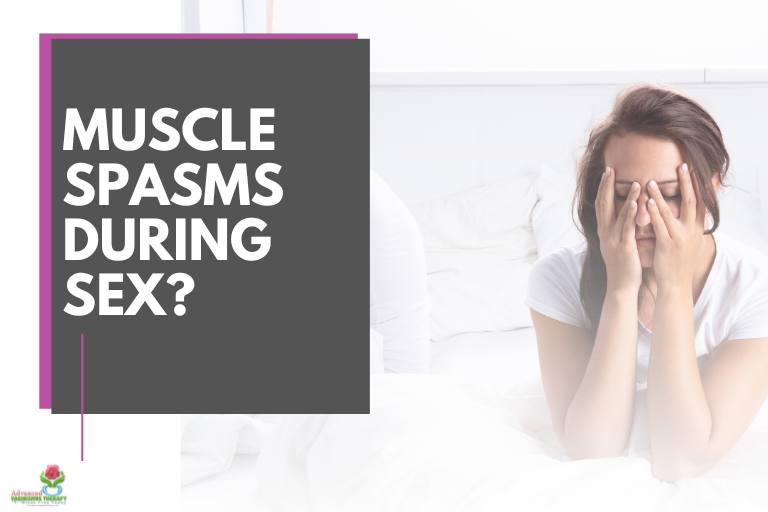Most people would agree that having a charley horse (intense muscle spasm) is not a fun thing. A lot of people get them in their calves, and sometimes pregnant woman experience a high number of them in their second and third trimesters. But have you ever experienced a muscle spasm. . .in your vagina?
The tricky thing about pain “down there” (pelvic pain) is that everyone’s body is different, so some women feel some spasms and pain just in their vagina, while some women feel pain around their uterus, lower back or even while they’re urinating.
PRIMARY OR SECONDARY?
Now, you might have heard the terms “Primary” or “Secondary” when referring to pelvic or vaginal pain, and the definition for that is “Primary pain” means a source for it hasn’t been diagnosed, while “secondary pain” means there’s a traceable cause for it. This actually was something me and my wife had to get to the root of as well.
Now, if you’ve searched “pain during sex” or “vaginal spasms” chances are you’ve come across the word “Dyspareunia” (pronounced dis-puh-ROO-nee-uh). It’s basically just a medical term for pain that happens before, during or even sometimes for hours after sex. You can find the full definition and symptoms here: https://www.mayoclinic.org/diseases-conditions/painful-intercourse/symptoms-causes/syc-20375967 but the different types of pain can range anywhere from some pain during sex to extreme pain during any sort of penetration. Which is also known as Vaginismus. Vaginismus is specifically what my wife struggled with, and is something I’m now able to help women find freedom in.
GENERAL REASONS:
Before we dive more into pelvic pain and the spasms they can cause, let’s talk about what the pelvic muscles even are. “Women’s Wellness Now” defines it as such: ‘The pelvic floor is a group of muscles that attach to the front, back, and sides of the pelvic bone and sacrum. Like a hammock, these muscles support organs of the pelvis, including the bladder, uterus, and rectum. These muscles also wrap around the urethra, vagina, and rectum.’ (https://womenswellnessnow.com/pelvic-floor-spasm/)
Now since pelvic pain can manifest in a variety of ways, here’s a few things that may indicate that something is up with your pelvic floor:
- Pelvic pain continuously
- Urinary Incontinence
- Constipation or blockage of any sort
- Bladder Pain
- Burning Pain in general
- Continuous spasms of muscle groups in the pelvic area
PELVIC SPASMS:
The definition of a spasm ‘refers to the involuntary and forceful contraction of a muscle, most commonly in the thighs, calves, feet, hands, and arms.’ (https://www.osmosis.org/answers/muscle-spasms) So if you’re having muscle spasms in your vagina, uterus, lower back or other areas “down there” it’s likely an indicator that something isn’t working the way it’s supposed to.
Now, this doesn’t mean you need to go and get a surgery done or get a prescription. This area of the body is also tied to emotional experiences such as childbirth or sex in a relationship, the odds are high that this could be more of a mental block than a purely physical issue.
Of course, if you have a trusted doctor, get a consultation. But because of everything my wife and I worked through with her struggle with Vaginismus, my goal in life is to help women overcome mental blocks like these that are impacting physical health.
WHAT DOES THIS MEAN FOR ME?
Remember, Pelvic Pain can cover a wide array of symptoms. You may only be having some mild pain in your lower back or hips, but for some people it’s painful and obvious that it’s coming from the uterus or vagina.
And Vaginismus doesn’t necessarily mean you have pain from any penetration, some women only experience it during sex or experience more mild spasms. But no matter what you’re feeling, hopefully defining these brought some clarity to what you may be experiencing.
Now this may feel like a lot of information, but know that I’ve been through this, so I can say with confidence: This is fixable, and not any sort of lifelong condition.
Me and my wife spent time dealing with this so I could save you time walking through this. I believe every relationship should be free of any pain or fear in their intimate life, and I believe every person should be able to share their struggles in a safe and comfortable environment.
Pain shouldn’t be a constant in your life, especially pain that may have been triggered by something completely out of your control. And because most of these things are just part of the human experience, they shouldn’t impair your intimate relationship with someone you care about, or cause stress in your day-to-day life.
To make things comfortable and respect the intimacy of this topic, we do a free strategy call that you’re able to do online, which you can easily do from home, wherever and whenever works for you.
You can do it easily over Zoom from the privacy of your house. Click here to start your journey: https://advancedvaginismustherapy.com/bookings/
You don’t need to buy some special cream or tool or try to find a doctor who will recommend something for you to try.
No more random, unhelpful Google searches. Or you trying to find answers in an awkward conversation with a friend or family member.
Click the link to talk to someone from the comfort of your own home. https://advancedvaginismustherapy.com/bookings/
Still on the fence? Check out all these stories of people who experienced the same thing and are now living in freedom:

